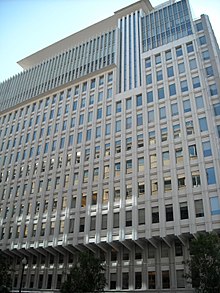Jock R. Anderson
At New England, he focused on research in farm management, risk, and uncertainty and received a doctor of philosophy in economics in 1970.
In 1991, he was appointed an emeritus professor at New England and departed to a full-time position as an agricultural economist and rural development policy advisor at the World Bank in Washington D.C.
A prolific author and editor of papers and publications related to his field, Anderson has continued to write and consult in retirement.
[1] As a child he lived on and helped tend his family's beef, pig, wheat, and sorghum farm, called "Clifton Hills," in the Upper Burnett area of Queensland.
[4] After receiving his master's degree, Anderson was employed as a research agronomist and applied production economist for ACF & Shirleys Fertilizers Ltd in Brisbane.
Anderson served as a research fellow under John L. Dillon, Foundation Chair of Farm Management, studying the pastoral-zone wool industry of Queensland and New South Wales.
[8] At New England, Anderson specialized in risk and uncertainty, in particular Bayesian statistics, stochastic processes and efficiency analysis, and modern decision theory as applied to agricultural economics.
With BAE, he managed a portfolio consisting of 200 economic researchers examining current issues and aspects of the agricultural industry.
Anderson subsequently returned to the Agriculture and Rural Development Department, where he served as a portfolio and strategy and policy advisor.
[12] During his time with the World Bank, Anderson accompanied a number of in-country missions, including to Bangladesh, Brazil, Ethiopia, Guinea, India, Indonesia, Kenya, Lesotho, Malawi, Morocco, Nepal, Pakistan, Papua New Guinea, Pakistan, Russia, Tanzania, Uganda, Uzbekistan, and Zimbabwe.
[14] In 2004 the second edition of Coping with Risk in Agriculture, co-authored by Anderson, Hardaker, Ruud B. M. Huirne, G. Lien, was published.
More recently, Anderson served as an Editor in Chief of Encyclopedia of Food Security and Sustainability, Elsevier, Oxford (3 volumes).
[10] From 1976 to 1986, he worked with the CIMMYT's parent organization Consultative Group on International Agricultural Research (known by its acronym, CGIAR).
[17] Anderson's professional associations while at New England included membership in the Australian Agricultural and Resource Economics Society (AARES), for which he was elected president in 1981, serving in that position for one year.
[1] Anderson has served two cycles, from 1978 to 1980 and 1986 to 1990, as an associate editor and member of the editorial council for the American Journal of Agricultural Economics.
From 1974 to 1977 he served on the editorial committee and, from 1978 to 1979, he was joint editor, with J. Brian Hardaker, of the Australian Journal of Agricultural Economics (AJAE), based in Canberra.
